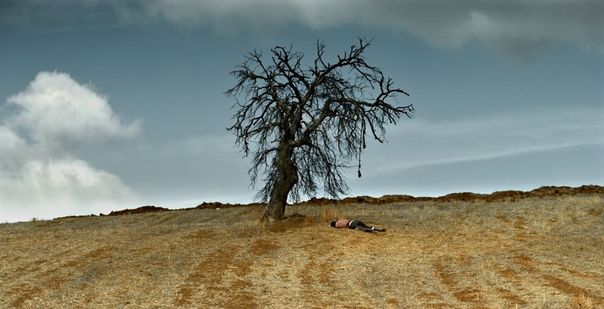The Wild Pear Tree
Jovan Marković

“Everything is too far” – says one character in THE WILD PEAR TREE / AHLAT AĞACI (2018), the latest film of celebrated Turkish director Nuri Bilge Ceylan. This sentence reflects the general impression the movie leaves, a kind of feeling we cannot precisely explain, that real life is always somewhere else and we can never reach it. This seems to be an obsessive topic in all of Ceylan’s movies from the beginning of his career, but in this film it is represented in the most effective way. In spite of the fact that it didn’t win any awards at Cannes Film Festival this year (unlike his previous work, which had big success), within the context of the Sarajevo Film Festival, where the film is presented amongst a retrospective of Ceylan’s work and a photo exhibition, it proves to be one of his strongest works. Celyan’s opus is recognizable by its specific narrative strategies that consist of avoiding a strong plot structure, creating an atmosphere rather than punctuating ideas or meanings, but in his last film he takes a few steps forward in that effort, trying to make a piece of art which could be wide and meaningless like reality itself. It does not mean that he is trying to depict some absurd world without a specific idea, but to create a movie which could embrace many ideas, without emphasizing a specific one, imitating in that way real life.
After graduating, Sinan (Doğu Demirkol) comes back to his hometown in rural Turkey. He still has to pass one more exam before he can become a teacher like his father Idris (Murat Cemcir). But he might have a bigger ambition – Sinan is writing a book about the life in his town, and he is trying to find financial support to get it published. We follow him through a series of encounters and conversations with a writer, the local authorities, and business owners to find support, but none of them understands the nature of his book. They expect some kind of historical approach (the town is connected with the Trojan War, which leads to the fact that the Trojan horse appears in one of Sinan’s almost supernatural dreams), which could be used for touristic purposes. However, Sinan writes a fictional novel about everyday life, about specific people and their destinies.
He meets a girl, with whom he had some kind of a love relationship in the past, and there is also one long and impressive scene when Sinan speaks with two imams about God. In all of these conversations, Ceylan deals with metaphysical issues, but in a very effective way – he treats these topics as regular parts of life, often with some degree of humor and irony. However, Ceylan does not condemn his characters, his humor is not sarcastic – it is filled with warmth. Sinan’s father Idris is secretly addicted to horse-gambling, a habit that is causing great distress in the family and deepening the distance between Sinan and his father. Besides his gambling, Idris is an impractical man who deals with useless ideas, like he digs a well where there is obviously no water. This kind of Sisyphean task is the reason why the whole city talks about Idris as some kind of a lunatic. Even Sinan shows a negative attitude towards his father, but it will come as no surprise that at the end of the movie it is obvious that they have more in common than he thought.
Even though there is not a straightforward story and one central point, we can extract one dominant stream that keeps all episodes together. The narrative of this film could best be described as a meandering river – or one of the many long and winding roads that Ceylan characteristically films – that, nevertheless, has some direction and course and keeps the water in the river bed. So, generally speaking, the theme that keeps all the pieces together is the human quest for the meaning of life and the subsequent attempt to give some sense to one’s own life. This may sound like a story as old as the world, but the narrative form of this movie makes that effort fresh and unique. The main reason why Ceylan succeeds in that is the fact that he does not try to represent the human search for the meaning of life in an explicit way, putting it on a high philosophical level, but to follow the process of that search with ordinary, often banal things which go with it. In that way, there is an interesting connection between the book Sinan writes and Ceylan’s movie. Traditionally, literature has the potential to go deeper in its explanation using the power of language, whereas cinema is thought to remain on the surface. Ceylan uses this discrepancy by putting the writer in the middle of his interest and then by showing everything which surrounds him and not trying to explain the actual process of writing, as is usual in the more ordinary movies about writers. This way he actually demonstrates how the image can be very nuanced and deep, especially when we spend so much time with it in his slow-cinema style. At least, Ceylan knows that the search for meanings is very elusive, and it cannot be precisely described.
THE WILD PEAR TREE is about that search and human desire, but not about any concrete result. Because of that, the narrative is structured as some kind of a journey and Sinan’s quest interweaves episodes and motifs (if Ceylan’s previous works had been compared with Chekhov, this movie would be closer to Ulysses by James Joyce). At the same time, this search seems aimless, condemned to defeat and the only opportunity that remains at the end is to imagine meaning, to create some purpose no matter how absurd. Or, actually, the more useless and absurd it is, the better it might be.

